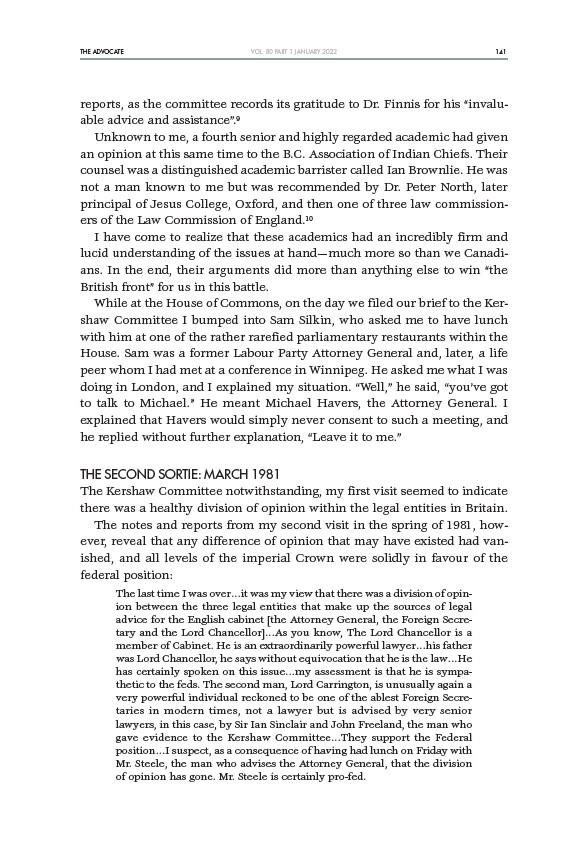
THE ADVOCATE 141
VOL. 80 PART 1 JANUARY 2022
reports, as the committee records its gratitude to Dr. Finnis for his “invaluable
advice and assistance”.9
Unknown to me, a fourth senior and highly regarded academic had given
an opinion at this same time to the B.C. Association of Indian Chiefs. Their
counsel was a distinguished academic barrister called Ian Brownlie. He was
not a man known to me but was recommended by Dr. Peter North, later
principal of Jesus College, Oxford, and then one of three law commissioners
of the Law Commission of England.10
I have come to realize that these academics had an incredibly firm and
lucid understanding of the issues at hand—much more so than we Canadians.
In the end, their arguments did more than anything else to win “the
British front” for us in this battle.
While at the House of Commons, on the day we filed our brief to the Kershaw
Committee I bumped into Sam Silkin, who asked me to have lunch
with him at one of the rather rarefied parliamentary restaurants within the
House. Sam was a former Labour Party Attorney General and, later, a life
peer whom I had met at a conference in Winnipeg. He asked me what I was
doing in London, and I explained my situation. “Well,” he said, “you’ve got
to talk to Michael.” He meant Michael Havers, the Attorney General. I
explained that Havers would simply never consent to such a meeting, and
he replied without further explanation, “Leave it to me.”
THE SECOND SORTIE: MARCH 1981
The Kershaw Committee notwithstanding, my first visit seemed to indicate
there was a healthy division of opinion within the legal entities in Britain.
The notes and reports from my second visit in the spring of 1981, however,
reveal that any difference of opinion that may have existed had vanished,
and all levels of the imperial Crown were solidly in favour of the
federal position:
The last time I was over…it was my view that there was a division of opinion
between the three legal entities that make up the sources of legal
advice for the English cabinet the Attorney General, the Foreign Secretary
and the Lord Chancellor…As you know, The Lord Chancellor is a
member of Cabinet. He is an extraordinarily powerful lawyer…his father
was Lord Chancellor, he says without equivocation that he is the law…He
has certainly spoken on this issue…my assessment is that he is sympathetic
to the feds. The second man, Lord Carrington, is unusually again a
very powerful individual reckoned to be one of the ablest Foreign Secretaries
in modern times, not a lawyer but is advised by very senior
lawyers, in this case, by Sir Ian Sinclair and John Freeland, the man who
gave evidence to the Kershaw Committee…They support the Federal
position…I suspect, as a consequence of having had lunch on Friday with
Mr. Steele, the man who advises the Attorney General, that the division
of opinion has gone. Mr. Steele is certainly pro-fed.